新人教版必修1 Unit4 Earthquakes知识点课件(46张ppt)
文档属性
| 名称 | 新人教版必修1 Unit4 Earthquakes知识点课件(46张ppt) |
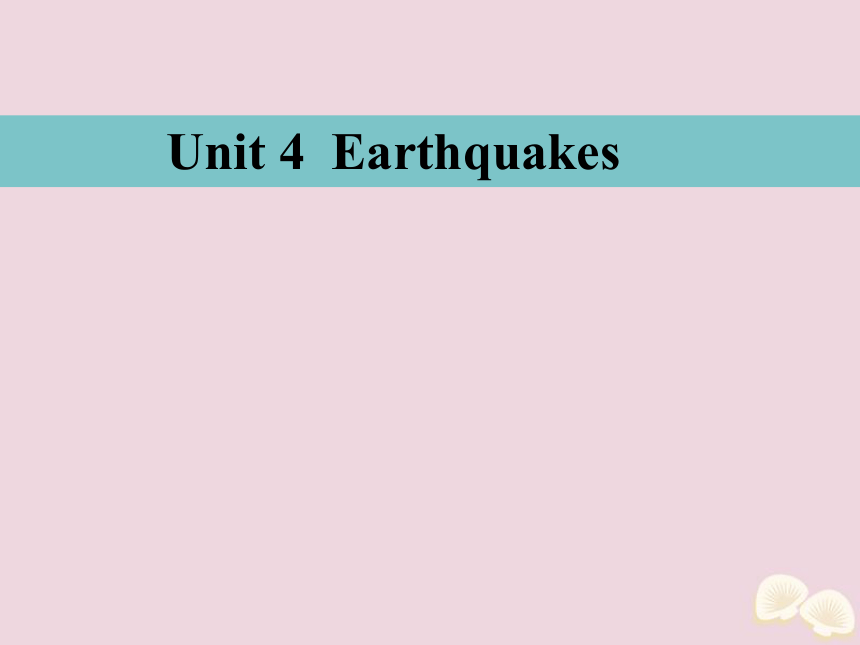
|
|
| 格式 | zip | ||
| 文件大小 | 605.5KB | ||
| 资源类型 | 教案 | ||
| 版本资源 | 人教版(新课程标准) | ||
| 科目 | 英语 | ||
| 更新时间 | 2019-08-25 00:00:00 | ||
图片预览

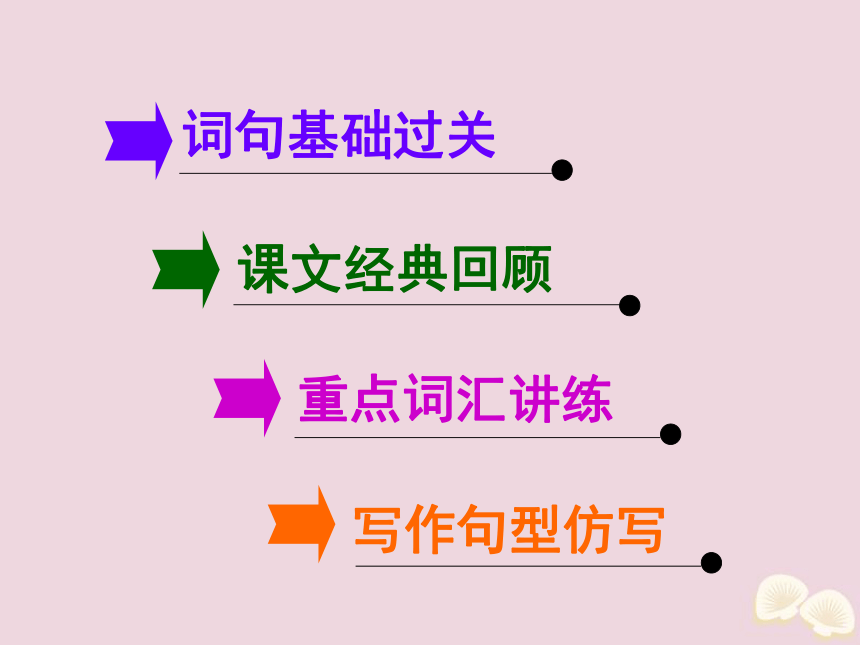

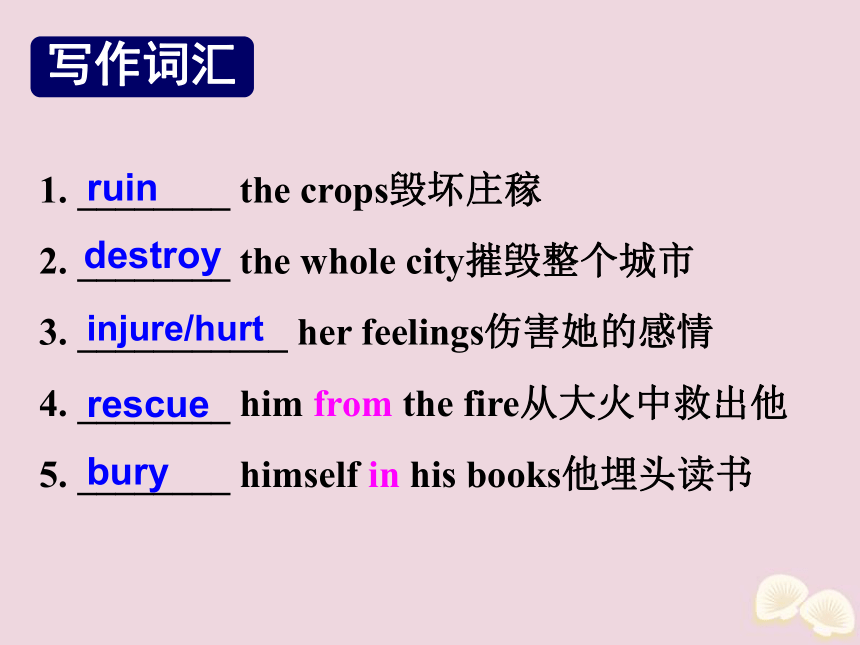
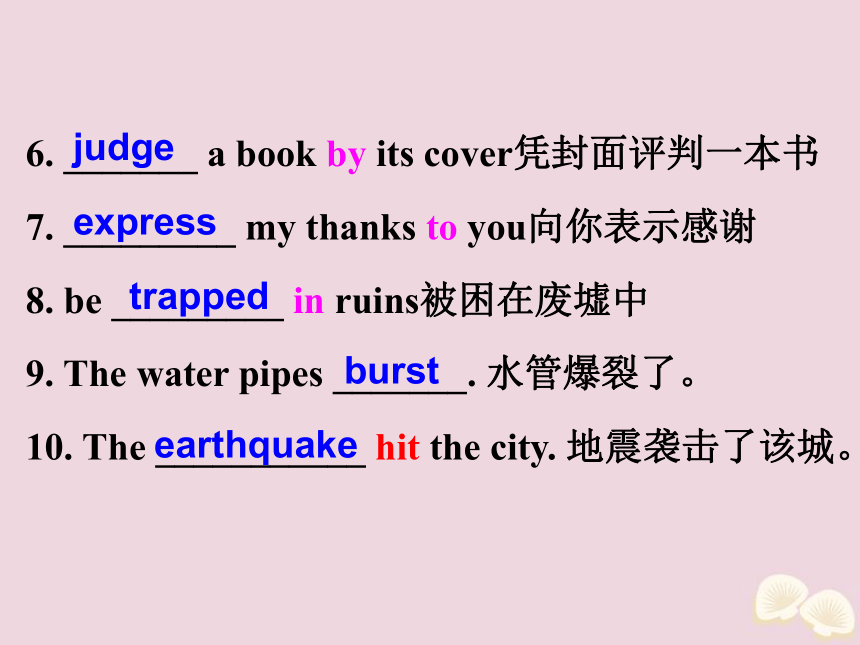
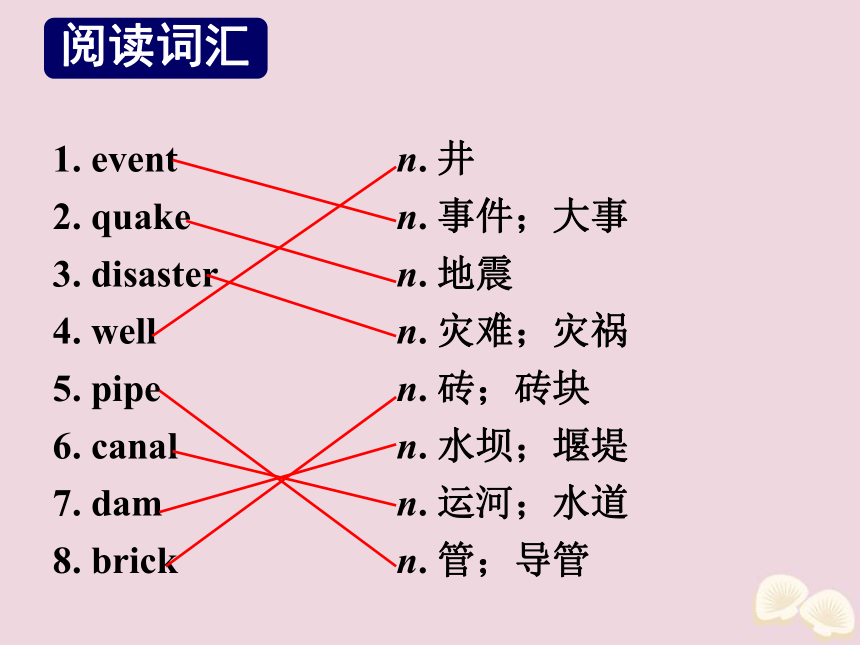

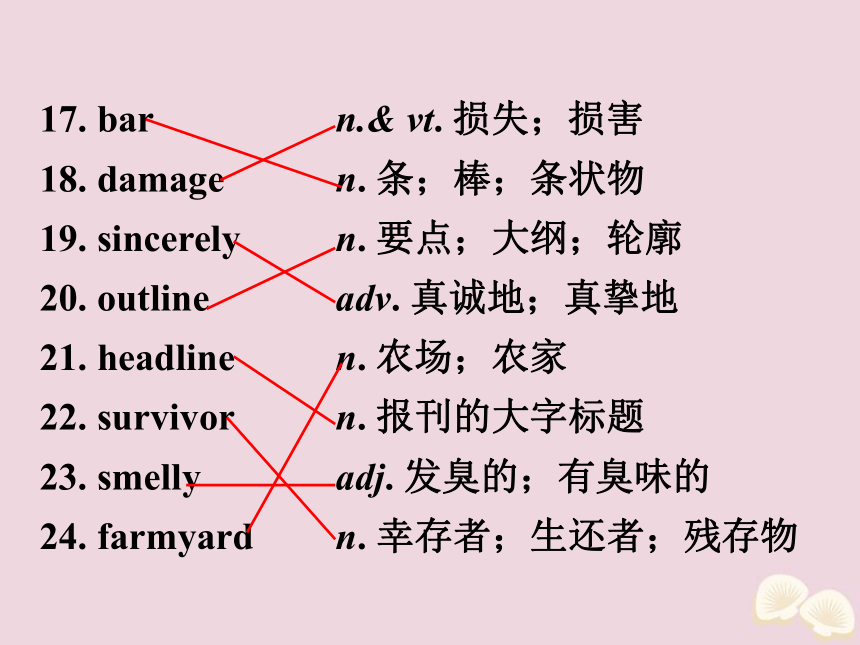
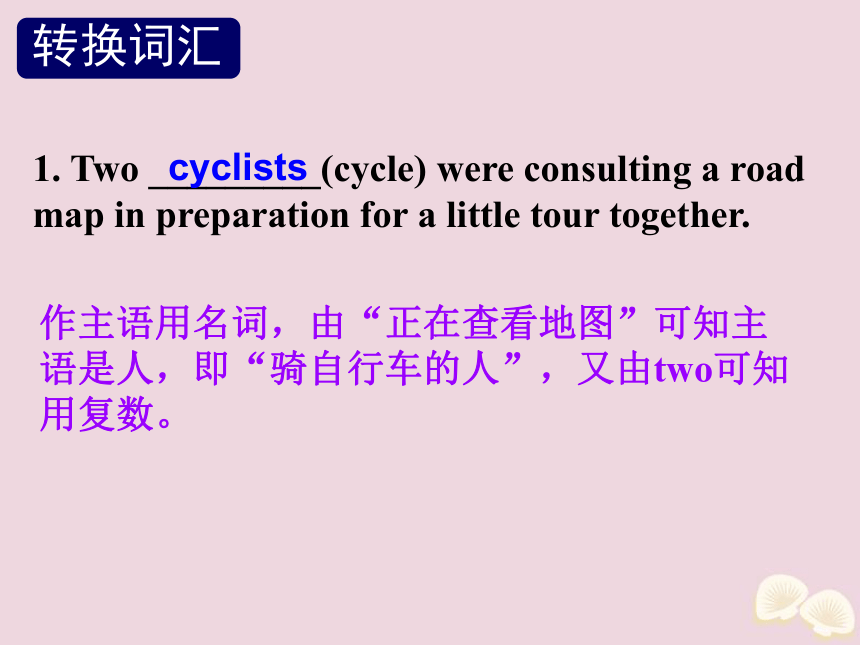
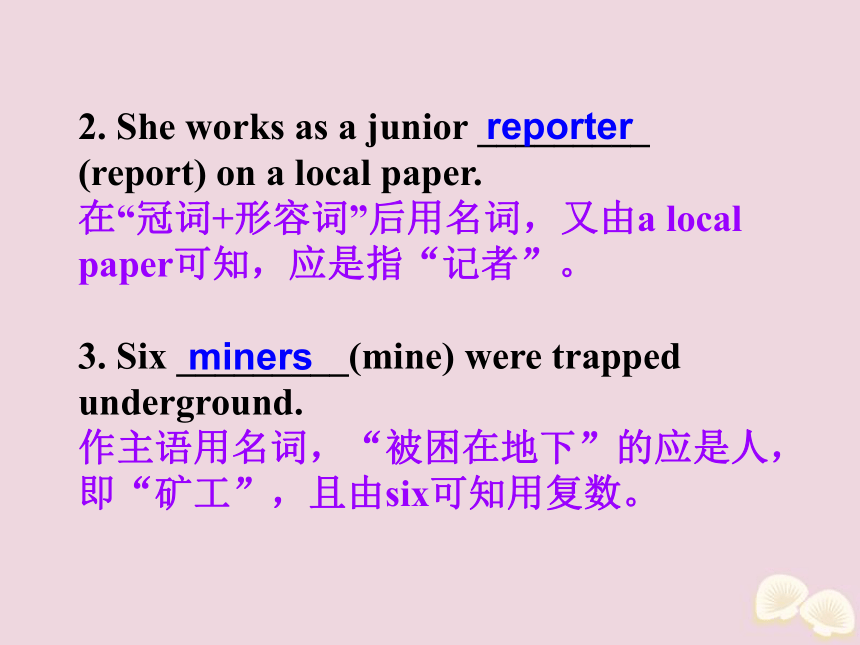
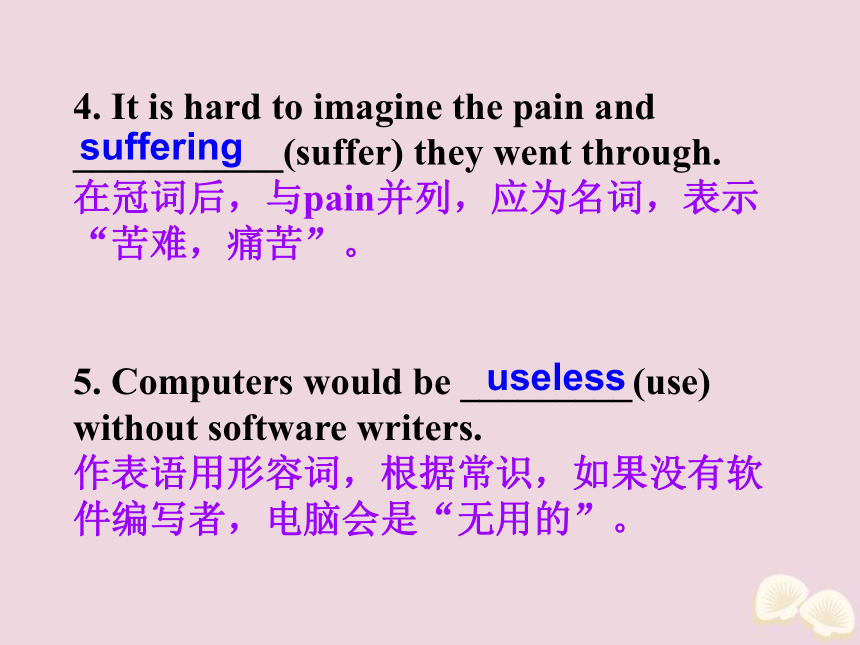

文档简介
(共46张PPT)
Unit 4 Earthquakes
课文经典回顾
重点词汇讲练
写作句型仿写
词句基础过关
1. ________ the crops毁坏庄稼
2. ________ the whole city摧毁整个城市
3. ___________ her feelings伤害她的感情
4. ________ him from the fire从大火中救出他
5. ________ himself in his books他埋头读书
ruin
destroy
injure/hurt
rescue
bury
6. _______ a book by its cover凭封面评判一本书
7. _________ my thanks to you向你表示感谢
8. be _________ in ruins被困在废墟中
9. The water pipes _______. 水管爆裂了。
10. The ___________ hit the city. 地震袭击了该城。
earthquake
judge
express
trapped
burst
1. event n. 井
2. quake n. 事件;大事
3. disaster n. 地震
4. well n. 灾难;灾祸
5. pipe n. 砖;砖块
6. canal n. 水坝;堰堤
7. dam n. 运河;水道
8. brick n. 管;导管
9. track n. 电;电流;电学
10. electricity n. 百万
11. million n. 民族;国家;国民
12. nation n. 轨道;足迹;痕迹
13. steam adj. 极度的
14. extreme n. 蒸汽;水汽
15. shelter n. 标题;头衔;资格
16. title n. 掩蔽;掩蔽处;避身处
17. bar n.& vt. 损失;损害
18. damage n. 条;棒;条状物
19. sincerely n. 要点;大纲;轮廓
20. outline adv. 真诚地;真挚地
21. headline n. 农场;农家
22. survivor n. 报刊的大字标题
23. smelly adj. 发臭的;有臭味的
24. farmyard n. 幸存者;生还者;残存物
1. Two _________(cycle) were consulting a road map in preparation for a little tour together.
作主语用名词,由“正在查看地图”可知主语是人,即“骑自行车的人”,又由two可知用复数。
cyclists
2. She works as a junior _________
(report) on a local paper.
在“冠词+形容词”后用名词,又由a local paper可知,应是指“记者”。
3. Six _________(mine) were trapped underground.
作主语用名词,“被困在地下”的应是人,即“矿工”,且由six可知用复数。
reporter
miners
4. It is hard to imagine the pain and ___________(suffer) they went through.
在冠词后,与pain并列,应为名词,表示“苦难,痛苦”。
5. Computers would be _________(use) without software writers.
作表语用形容词,根据常识,如果没有软件编写者,电脑会是“无用的”。
suffering
useless
6. I was ___________(frighten) of being left by myself in the house.
表示人“感到恐吓的”用-ed形容词。
7. Please give him my ________________ (congratulate) when you see him.
在形容词性物主代词后用名词,表示“祝贺,贺词”常用复数形式。
frightened
congratulations
8. She looked at me as if I had said a ________ (dirt) word.
在名词前作定语用形容词,表示“脏的”。
9. She was so __________(shock) that she could hardly bring out a word.
作表语用形容词,表示人“感到震惊的”用 -ed 形容词。
dirty
shocked
1. ____________________ families许多家庭
2. _____________ road accidents交通事故的数量
3. _______ the trapped miners挖出困在井下的矿工
4. He behaves _____ he were a child. 他举止像小孩。
5. get in touch with him __________马上和他联系
right away/at once
a (great) number of/a lot of/lots of/dozens of/plenty of/scores of
the number of
dig out
as if
6. My holiday is __________. 我的假期结束了。
7. lay_________成了废墟
8. ___________of the students五分之三的学生
9. __________of the earth’s surface三分之二的地表
10. choose Tom _________ Jim选择汤姆而非吉姆
11. care for ________and________关心老人和病人
the sick
at an end
in ruins
three-fifths
two-thirds
instead of
the old
1. It seemed as if the world ___________ (be) at an end! 看起来好像到了世界末日!
2. ____________ they looked nearly everything was destroyed. 人们无论朝哪里看,哪里的一切都几乎被毁了。
3. All hope was not _____(lose).不是所有的希望都破灭了。
was/were
Everywhere
lost
4. In the farmyards,the chickens and even the pigs were too nervous _______(eat). 农家大院里的鸡甚至猪都紧张得不想吃食。
5. But one million people of the city, ______ thought little of these _______ (event),were asleep ____usual that night.但是唐山市的100万居民几乎没有把这些情况当回事,当天晚上照常睡着了。
as
to eat
who
events
At 3:42 a.m. everything began to shake. It seemed as if the world was at an end! Eleven kilometres 1 ________(direct) below the city, the 2 ________(great) earthquake of the 20th century had begun. It was felt in Beijing, 3 _______ is more than two hundred kilometres away. One-third of the nation felt it. A huge crack that was eight kilometres long and thirty metres wide cut across houses, roads and canals. Steam burst from holes 4 ___the ground. Hard hills of rock became rivers of dirt.
directly
greatest
which
in
In fifteen terrible seconds a large city 5 ____ (lie) in ruins. The suffering of the people 6 _____ (be) extreme. Two-thirds of 7 ______(they) died or were injured during the earthquake. Thousands of families were killed and many 8_________ (child) were left without parents. 9 _____ number of people who were killed or injured reached more than 400,000. Then, later that afternoon, another big quake shook Tangshan. More buildings fell down. Water, food, and electricity were hard
10 _______(get). People began to wonder how long the disaster would last.
to get
lay
was
them
children
The
All hope was not lost. Soon after the quakes the army sent 150,000 soldiers to Tangshan to helping
the rescue workers. Hundreds of thousands people
were helped. The army organized teams to dig out those that were trapped and to bury the dead.
To the north of the city, most of the 10,000 miners are rescued from the coal mines here.
Workers built shelters to survivors whose
home had been destroyed. Fresh water was
taken to the city by the train, truck and plane. Slow, the city began to breath again.
1. helping→ help 作目的状语用不定式(to do)。
2. 在people前加of 表示具体几千人不用of,thousand也不用复数,如three thousand people;表示数以千计的人,thousands后要加of。
3. that→ who 当先行词是指人的those时,只能用who引导定语从句。
4. are→ were 由上下文谓语动词时态可知,用过去时。
5. here→ there 指这座城市北面的煤矿“那里”。
6. to→ for 表示“为某人”造庇护所/房子,用for sb。
7. home→ homes 由前面的shelters和survivors可知,用复数。
8. 去掉by后的the 用by表示“乘”车/船/飞机等,习惯上说by bus/train/boat/plane,不用冠词。
9. Slow→ Slowly 位于句首,修饰全句,用副词作状语。
10. breath→ breathe 表示开始做某事是begin to do sth,故名词breath要改为动词breathe。
1. burst v. 爆裂;突发
burst in闯进来;突然插嘴
burst into sth 突然(哭,笑起来);闯入
burst into laughter=burst out laughing放声大笑
burst into tears=burst out crying放声大哭
⑴ The audience burst _____ cheers.
⑵ When we were chatting in the room,he burst ____.
⑶ As she was talking,the old man burst _____ crying with excitement.
填入一个恰当的词。
out
into
in
_________ adj. 受伤的;受损害的
2. injure vt. 伤害;使受伤;损害
说出下列各句的汉语意思。
⑴ Three people were killed and five injured in the crash.
injured
撞车事故中三人死亡, 五人受伤。
⑵ He injured his knee yesterday.
他昨天伤了膝盖。
⑶ I hope I didn’t injure her feelings.
我希望我没有伤害她的感情。
⑷ Dishonesty injures a business.
欺骗有害生意。
__________ adj.(人)感到震惊的
__________ adj. (事)令人震惊的
3. shock v.(使)震惊;震动
n.休克;打击;震惊
⑴ 尤指令人不愉快;
⑵ 作vt. 时,多用于被动语态;
⑶ 作n.表示“令人震惊的事”时,前用a。
shocking
shocked
⑴ 听到这个消息,我十分震惊。(一句多译)
a. I _____________ to hear the news.
b. I _______________ the news.
c. ___________ me to hear the news.
d. The news _________ a shock.
gave me
was shocked
was shocked at
It shocked
⑵ 听到这个令人震惊的消息,他感到震惊。
He was shocked __________________________ news.
to hear /at the shocking news
rescue…from… 从……中抢救或营救……
go/come to one’s rescue援救或帮助某人
rescue work/workers抢救工作/救援人员
4. rescue n. & vt. 援救;营救
(save…from harm or danger;set free)
⑴ 救生艇被派出去救沉船的水手。
The life boat was sent out _________ the sailors ______ the sinking ship.
⑵ 直升机从失火大楼的楼顶救出了将近20人。
Helicopters rescued nearly 20 people from the roof of the burning building.
from
to rescue
judge…from/by… 从……来判断……
as far as I can judge 据我判断, 我认为
judging by/from 从……上看;根据……判断
5. judge vt. 断定;判断;判决
n. 裁判员;法官
judging from/by用在句首时, 为一个独立成分, 不受句子主语和时态影响, 只用现在分词作状语, 而不用过去分词。
(1) Schools tend to ____________________ (根据……来判断) the performance of their students in exams.
(2) _________________________ (从表情上看) on Adam’s face, the news must have been terrible.
Judging by/from the look
be judged by/from
at the end of…在……的尽头,末端(指时间、地点等)
by the end of…到……末之前(指时间,常与完成时连用)
in the end/ finally/ at last/ eventually最后; 终于
put an end to…结束……
come to an end结束
6. at an end 终了;结束
填入一个适当的词。
⑴ My friend is waiting for me ____ the end of the road.
⑵ ____ the end of last month we had finished Book 4.
⑶ ____ the end,they got to their destination.
at
By
In
⑷ The old life is at ____ end.
⑸ The meeting come to ____ end at last.
⑹ It’s time to put _____ end ____ the meeting.
to
an
an
an
“a number of+复数名词”作主语时,谓语动词用复数;“the number of+复数名词”作主语时,谓语动词用单数。
7. a great number of+复数名词 许多;大量
the number of+复数名词 ……的数目
The number of the people invited to the party _____(be)50 last night,but a number of them ______(be) absent for different reasons.
were
was
1. It seemed as if/though… 看上去好像……;
似乎……
可说It seems that…
⑴ 看上去好像除了我之外别人都知道。
________________________________________
except me.
⑵ 听她说话的口气她好像去过美国。
It seemed as if she had been to America from her words.
It seems as if/though everybody knows it
2. all…not=not all… 并非都……
all、both、each、always、every及every的合成词与not连用时表部分否定。
⑴ 不是所有的学生都通过了考试。
____________________ have passed the exam.
⑵ 并不是每个人都像你那么自私。
_______________ is as selfish as you.
Not everyone
Not all the students
Unit 4 Earthquakes
课文经典回顾
重点词汇讲练
写作句型仿写
词句基础过关
1. ________ the crops毁坏庄稼
2. ________ the whole city摧毁整个城市
3. ___________ her feelings伤害她的感情
4. ________ him from the fire从大火中救出他
5. ________ himself in his books他埋头读书
ruin
destroy
injure/hurt
rescue
bury
6. _______ a book by its cover凭封面评判一本书
7. _________ my thanks to you向你表示感谢
8. be _________ in ruins被困在废墟中
9. The water pipes _______. 水管爆裂了。
10. The ___________ hit the city. 地震袭击了该城。
earthquake
judge
express
trapped
burst
1. event n. 井
2. quake n. 事件;大事
3. disaster n. 地震
4. well n. 灾难;灾祸
5. pipe n. 砖;砖块
6. canal n. 水坝;堰堤
7. dam n. 运河;水道
8. brick n. 管;导管
9. track n. 电;电流;电学
10. electricity n. 百万
11. million n. 民族;国家;国民
12. nation n. 轨道;足迹;痕迹
13. steam adj. 极度的
14. extreme n. 蒸汽;水汽
15. shelter n. 标题;头衔;资格
16. title n. 掩蔽;掩蔽处;避身处
17. bar n.& vt. 损失;损害
18. damage n. 条;棒;条状物
19. sincerely n. 要点;大纲;轮廓
20. outline adv. 真诚地;真挚地
21. headline n. 农场;农家
22. survivor n. 报刊的大字标题
23. smelly adj. 发臭的;有臭味的
24. farmyard n. 幸存者;生还者;残存物
1. Two _________(cycle) were consulting a road map in preparation for a little tour together.
作主语用名词,由“正在查看地图”可知主语是人,即“骑自行车的人”,又由two可知用复数。
cyclists
2. She works as a junior _________
(report) on a local paper.
在“冠词+形容词”后用名词,又由a local paper可知,应是指“记者”。
3. Six _________(mine) were trapped underground.
作主语用名词,“被困在地下”的应是人,即“矿工”,且由six可知用复数。
reporter
miners
4. It is hard to imagine the pain and ___________(suffer) they went through.
在冠词后,与pain并列,应为名词,表示“苦难,痛苦”。
5. Computers would be _________(use) without software writers.
作表语用形容词,根据常识,如果没有软件编写者,电脑会是“无用的”。
suffering
useless
6. I was ___________(frighten) of being left by myself in the house.
表示人“感到恐吓的”用-ed形容词。
7. Please give him my ________________ (congratulate) when you see him.
在形容词性物主代词后用名词,表示“祝贺,贺词”常用复数形式。
frightened
congratulations
8. She looked at me as if I had said a ________ (dirt) word.
在名词前作定语用形容词,表示“脏的”。
9. She was so __________(shock) that she could hardly bring out a word.
作表语用形容词,表示人“感到震惊的”用 -ed 形容词。
dirty
shocked
1. ____________________ families许多家庭
2. _____________ road accidents交通事故的数量
3. _______ the trapped miners挖出困在井下的矿工
4. He behaves _____ he were a child. 他举止像小孩。
5. get in touch with him __________马上和他联系
right away/at once
a (great) number of/a lot of/lots of/dozens of/plenty of/scores of
the number of
dig out
as if
6. My holiday is __________. 我的假期结束了。
7. lay_________成了废墟
8. ___________of the students五分之三的学生
9. __________of the earth’s surface三分之二的地表
10. choose Tom _________ Jim选择汤姆而非吉姆
11. care for ________and________关心老人和病人
the sick
at an end
in ruins
three-fifths
two-thirds
instead of
the old
1. It seemed as if the world ___________ (be) at an end! 看起来好像到了世界末日!
2. ____________ they looked nearly everything was destroyed. 人们无论朝哪里看,哪里的一切都几乎被毁了。
3. All hope was not _____(lose).不是所有的希望都破灭了。
was/were
Everywhere
lost
4. In the farmyards,the chickens and even the pigs were too nervous _______(eat). 农家大院里的鸡甚至猪都紧张得不想吃食。
5. But one million people of the city, ______ thought little of these _______ (event),were asleep ____usual that night.但是唐山市的100万居民几乎没有把这些情况当回事,当天晚上照常睡着了。
as
to eat
who
events
At 3:42 a.m. everything began to shake. It seemed as if the world was at an end! Eleven kilometres 1 ________(direct) below the city, the 2 ________(great) earthquake of the 20th century had begun. It was felt in Beijing, 3 _______ is more than two hundred kilometres away. One-third of the nation felt it. A huge crack that was eight kilometres long and thirty metres wide cut across houses, roads and canals. Steam burst from holes 4 ___the ground. Hard hills of rock became rivers of dirt.
directly
greatest
which
in
In fifteen terrible seconds a large city 5 ____ (lie) in ruins. The suffering of the people 6 _____ (be) extreme. Two-thirds of 7 ______(they) died or were injured during the earthquake. Thousands of families were killed and many 8_________ (child) were left without parents. 9 _____ number of people who were killed or injured reached more than 400,000. Then, later that afternoon, another big quake shook Tangshan. More buildings fell down. Water, food, and electricity were hard
10 _______(get). People began to wonder how long the disaster would last.
to get
lay
was
them
children
The
All hope was not lost. Soon after the quakes the army sent 150,000 soldiers to Tangshan to helping
the rescue workers. Hundreds of thousands people
were helped. The army organized teams to dig out those that were trapped and to bury the dead.
To the north of the city, most of the 10,000 miners are rescued from the coal mines here.
Workers built shelters to survivors whose
home had been destroyed. Fresh water was
taken to the city by the train, truck and plane. Slow, the city began to breath again.
1. helping→ help 作目的状语用不定式(to do)。
2. 在people前加of 表示具体几千人不用of,thousand也不用复数,如three thousand people;表示数以千计的人,thousands后要加of。
3. that→ who 当先行词是指人的those时,只能用who引导定语从句。
4. are→ were 由上下文谓语动词时态可知,用过去时。
5. here→ there 指这座城市北面的煤矿“那里”。
6. to→ for 表示“为某人”造庇护所/房子,用for sb。
7. home→ homes 由前面的shelters和survivors可知,用复数。
8. 去掉by后的the 用by表示“乘”车/船/飞机等,习惯上说by bus/train/boat/plane,不用冠词。
9. Slow→ Slowly 位于句首,修饰全句,用副词作状语。
10. breath→ breathe 表示开始做某事是begin to do sth,故名词breath要改为动词breathe。
1. burst v. 爆裂;突发
burst in闯进来;突然插嘴
burst into sth 突然(哭,笑起来);闯入
burst into laughter=burst out laughing放声大笑
burst into tears=burst out crying放声大哭
⑴ The audience burst _____ cheers.
⑵ When we were chatting in the room,he burst ____.
⑶ As she was talking,the old man burst _____ crying with excitement.
填入一个恰当的词。
out
into
in
_________ adj. 受伤的;受损害的
2. injure vt. 伤害;使受伤;损害
说出下列各句的汉语意思。
⑴ Three people were killed and five injured in the crash.
injured
撞车事故中三人死亡, 五人受伤。
⑵ He injured his knee yesterday.
他昨天伤了膝盖。
⑶ I hope I didn’t injure her feelings.
我希望我没有伤害她的感情。
⑷ Dishonesty injures a business.
欺骗有害生意。
__________ adj.(人)感到震惊的
__________ adj. (事)令人震惊的
3. shock v.(使)震惊;震动
n.休克;打击;震惊
⑴ 尤指令人不愉快;
⑵ 作vt. 时,多用于被动语态;
⑶ 作n.表示“令人震惊的事”时,前用a。
shocking
shocked
⑴ 听到这个消息,我十分震惊。(一句多译)
a. I _____________ to hear the news.
b. I _______________ the news.
c. ___________ me to hear the news.
d. The news _________ a shock.
gave me
was shocked
was shocked at
It shocked
⑵ 听到这个令人震惊的消息,他感到震惊。
He was shocked __________________________ news.
to hear /at the shocking news
rescue…from… 从……中抢救或营救……
go/come to one’s rescue援救或帮助某人
rescue work/workers抢救工作/救援人员
4. rescue n. & vt. 援救;营救
(save…from harm or danger;set free)
⑴ 救生艇被派出去救沉船的水手。
The life boat was sent out _________ the sailors ______ the sinking ship.
⑵ 直升机从失火大楼的楼顶救出了将近20人。
Helicopters rescued nearly 20 people from the roof of the burning building.
from
to rescue
judge…from/by… 从……来判断……
as far as I can judge 据我判断, 我认为
judging by/from 从……上看;根据……判断
5. judge vt. 断定;判断;判决
n. 裁判员;法官
judging from/by用在句首时, 为一个独立成分, 不受句子主语和时态影响, 只用现在分词作状语, 而不用过去分词。
(1) Schools tend to ____________________ (根据……来判断) the performance of their students in exams.
(2) _________________________ (从表情上看) on Adam’s face, the news must have been terrible.
Judging by/from the look
be judged by/from
at the end of…在……的尽头,末端(指时间、地点等)
by the end of…到……末之前(指时间,常与完成时连用)
in the end/ finally/ at last/ eventually最后; 终于
put an end to…结束……
come to an end结束
6. at an end 终了;结束
填入一个适当的词。
⑴ My friend is waiting for me ____ the end of the road.
⑵ ____ the end of last month we had finished Book 4.
⑶ ____ the end,they got to their destination.
at
By
In
⑷ The old life is at ____ end.
⑸ The meeting come to ____ end at last.
⑹ It’s time to put _____ end ____ the meeting.
to
an
an
an
“a number of+复数名词”作主语时,谓语动词用复数;“the number of+复数名词”作主语时,谓语动词用单数。
7. a great number of+复数名词 许多;大量
the number of+复数名词 ……的数目
The number of the people invited to the party _____(be)50 last night,but a number of them ______(be) absent for different reasons.
were
was
1. It seemed as if/though… 看上去好像……;
似乎……
可说It seems that…
⑴ 看上去好像除了我之外别人都知道。
________________________________________
except me.
⑵ 听她说话的口气她好像去过美国。
It seemed as if she had been to America from her words.
It seems as if/though everybody knows it
2. all…not=not all… 并非都……
all、both、each、always、every及every的合成词与not连用时表部分否定。
⑴ 不是所有的学生都通过了考试。
____________________ have passed the exam.
⑵ 并不是每个人都像你那么自私。
_______________ is as selfish as you.
Not everyone
Not all the students
